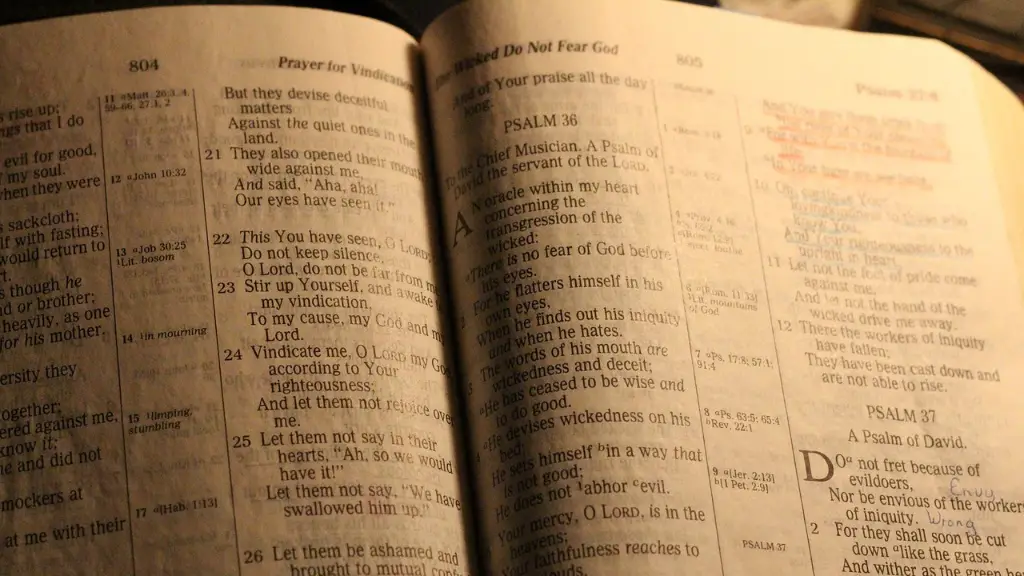One of the biggest points of contention in modern-day society is how the Bible views homosexuality. As the issue continues to gain attention, many Christians struggle to discern what the Bible actually says on the subject. Does the Bible condemn homosexuality, or is it an acceptable lifestyle?
The Bible does indeed state that homosexuality is an abomination and a sin in the eyes of God. In the Old Testament, Leviticus 20:13 specifically states that “If a man lies with a male as with a woman, both of them have committed an abomination; they shall surely be put to death; their blood is upon them.” In regards to this verse, theologians point to how God considers homosexuality to be a violation of His design for marriage between one man and one woman. This belief is reiterated in the New Testament in several verses, including Romans 1:26-27 and 1 Corinthians 6:9.
Studies have also revealed that a considerable segment of theologians believe that the Bible views homosexual behavior as sinful. For instance, a survey of nearly 1300 theologians in North America found that 65% of respondents stated that they believed homosexual behavior was always wrong. Meanwhile, 30% of the same survey’s respondents stated that they believed homosexual behavior was wrong but “there are greater sins to worry about within scripture.” On the other hand, 6% said that homosexual behavior was not sinful.
Notably, some theologians have pointed out the distinction between acts of homosexual behavior, and the fact that one can be attracted to someone of the same gender without necessarily engaging in homosexual behavior. According to these theologians, it is the actual sin of engaging in homosexual behavior that is condemned in the Bible. This interpretation is especially popular among sects such as the Catholic Church, who view homosexuality as an inclination, or a temptation, rather than a sin.
While there is some disagreement among theologians on the matter of homosexual behavior, they all agree that love is valued and respected in the Bible. The Bible is clear that the love between individuals, whether they are of the same or opposite gender, is of great importance, and the love and devotion between two people should not be discouraged. In short, the Bible may condemn homosexual behavior, but it never condemns loving, healthy relationships between individuals of the same gender.
Effects of Bible’s Condemnation to Homosexuality
As mentioned earlier, it is a widely accepted view that the Bible condemns homosexual behavior. This has led to the negative stereotyping of members of the LGBTQIA+ community and views of homophobia from many conservative Christians. This creates an environment of intolerance and discrimination, which has undoubtedly had a detrimental effect on mental health as evidenced by numerous studies.
Furthermore, some experts have pointed to the results of this negative environment, claiming it has made members of the LGBTQIA+ community more vulnerable to discrimination, poverty and social exclusion. This has caused both physical and psychological distress, as well as an increased risk of violence and even death. This is still the case in many countries where conservative interpretation of the Bible is adhered to.
In addition to this, the condemnation of homosexual behavior in the Bible has led to a distrust of religious institutions among members of the LGBTQIA+ community. This has led to a decrease in religious attendance among them, and increased feelings of social alienation due to hostile environments within religious institutions.
Advocacy and Support within Religious Communities
Although church leaders and theologians have traditionally opposed homosexual behavior, there is an increasing trend of religious communities advocating for and supporting LGBTQIA+ rights. This includes denominations of Christianity such as the United Church of Christ and the Episcopal Church, as well as Jewish and Muslim communities. Churches and mosques are being used as a platform for individuals to speak out about the effects of discrimination and to advocate for increased acceptance and tolerance of LGBTQIA+ persons.
In addition, more religious leaders are speaking out in favor of LGBTQIA+ individuals, often citing scripture that contrasts with the traditional views on homosexuality. This has provided a platform for members of the LGBTQIA+ community to share their struggles and their achievements, as well as to evangelize a message of tolerance and love.
Many religious leaders are also providing support and resources to assist the members of the LGBTQIA+ community. This includes providing counseling, education, and advocacy services which are specifically tailored to provide support and guidance to those who are struggling. This has provided much needed hope and comfort to those who feel isolated or ignored by their religious communities.
Acceptance of Homosexuality as an Alternative Lifestyle
In modern-day society, attitudes towards homosexuality have changed dramatically. Whereas the practice of homosexuality was once viewed as a taboo subject, it is now becoming increasingly accepted as an alternative lifestyle. This shift is due in part to increased public awareness and acceptance of the LGBTQIA+ community, as well as an increased understanding of sexuality.
This shift has been evident in governmental legislation as well. Same-sex marriage and other forms of legal recognition of the LGBTQIA+ community has been a civil right issue that many countries have had to grapple with. For instance, in 2015 the US Supreme Court legalized same-sex marriage in all 50 states. This ruling served as a major victory for the gay rights movement in America.
Furthermore, public opinion polls have indicated that a majority of people in America now support same-sex marriage, with 73% of adults in favor of the concept. This is a drastic shift from 20 years ago, where public opinion on the issue was largely divided and it was not considered a mainstream opinion.
Views on Homosexuality from Within the LGBTQIA+ Community
Within the LGBTQIA+ community, opinions on the Bible’s stance on homosexuality vary greatly. Some individuals choose to reject the Bible’s teachings, while others choose to embrace them and try to reconcile the two views. For instance, some individuals argue that the Bible is not meant to be taken literally, and is less a rulebook and more a guide to living a kind and compassionate life.
It is important to note that the focus should be on honori
ng the dignity of all individuals regardless of sexual orientation, and not judging individuals by their choices of lifestyle. This is especially true in religious environments, where respect and compassion should be paramount. Focusing on unconditional love rather than condemnation is essential in creating positive, accepting relationships between members of the LGBTQIA+ community and their religious counterparts.
Conclusion of Spiritual Affirmation for LGBTQIA+ persons
Overall, the Bible does condemn homosexual behavior, but it does not condemn loving relationships between individuals of the same gender. At the same time, religious communities are increasingly advocating for and supporting members of the LGBTQIA+ community. This is an encouraging sign of increased acceptance and understanding of the struggles faced by the people of this community.
Furthermore, it is important to emphasize that individuals should not be judged by their choices of lifestyle or orientation. It is essential to provide acceptance and spiritual affirmation for members of the LGBTQIA+ community and to foster an environment of understanding and compassion. This is the only way to achieve true peace and acceptance within religious institutions.




